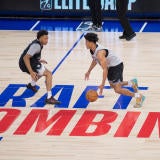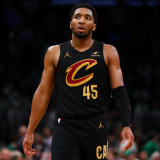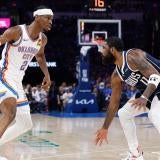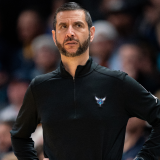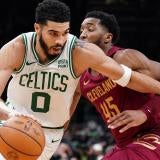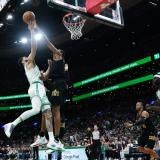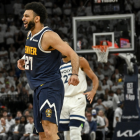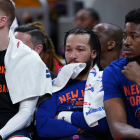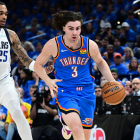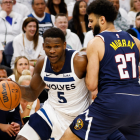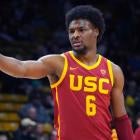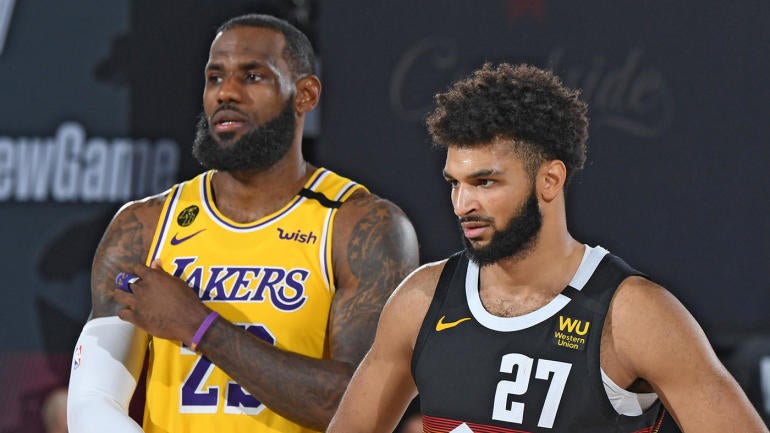
The Denver Nuggets, down 3-1 to the Los Angeles Lakers in the Western Conference finals, do not, in fact, have them right where they want them.
But they may, in the years ahead, look back at this series and see a critical catalyst in their leap forward from good-team-with-a-great-story to a great team whose tale actually ends in a championship.
We are always -- in sports, as fans, in a country at large in things big and small -- fixated on the moment, the now, the immediate. But it's the long game -- what Erik Spoelstra poignantly called Wednesday night the underestimated power of "months of work, sweat and grind" -- that usually brings out actually, lasting greatness.
And on Thursday, in Denver's 114-108 loss to LeBron & Co., you saw all of that: The work, the sweat, the grind, and the months of more of all of those things ahead for Denver, mixed with the bitter pill of the so-close-but-not-close-enough reality they will wrestle with for months, if they don't pull another 3-1 miracle comeback.
There was, unlike in Game 3, a lack of physicality by the Nuggets that speaks to how hard it is to muster such energy and momentum, over and over, in the playoffs, and particularly against LeBron-led teams.
There was the Lakers turning Game 3's rebounding route into a 41-33 advantage on the glass. There was, in the end -- in another close game, in which Denver again had a shot at erasing a double-digit lead -- LeBron stepping up to guard Nuggets phenom Jamal Murray and teach the 23-year-old a first-person lesson about the level of difficulty of making, let alone winning, an NBA championship.
"Helluva player," LeBron told TNT postgame about his decision to guard Murray down the stretch. "He's one of the hottest players we have in the bubble left today. Just using my length, using my athleticism and also being smart. I've been in this for a long time, and the worst thing you can do is put a great shooter on the free-throw line. Just high hands, hope he misses a few."
It may not feel like it now, but LeBron deciding -- and needing -- to use his experience and talents and smarts to shut down Murray, and doing it successfully, bodes well for Denver's long-term future, if obviously not its immediate one. And though Denver would surely have taken the win, NBA history says they're getting something almost as important: An education, one that most past NBA champions required to get to that future they craved.
This is something Hall of Fame player and two-time NBA champion Isiah Thomas talks about often, including when he and I visited this summer, after "The Last Dance." He's a big believer in the lessons that come with losing to greatness, and seeing, first-hand, and learning, painfully, just what the line is between good enough and almost good enough.
"The credit that we give to the Lakers and the Celtics -- and me myself to Bird and Magic -- from learning was so important," he said. "That's how we got better. We had to go to school."
My CBS Sports HQ colleague, and former NBA champion, Avery Johnson echoed that same sentiment when I asked him if the Spurs' 1998 loss to the Utah Jazz in five games in the second-round played a role in San Antonio's title run the next season.
"(The) loss in 1998 was the springboard for us in 1999! We had to get tougher, smarter, craftier, more unselfish and play thru adversity!!!," Avery texted me. "Our excuses and poor execution was exposed so we decided to improve in those areas. Pop and R.C. did a nice job of adding toughness, experience and defenders in free agency!!"
Denver wants a Finals berth and an NBA championship this postseason. Of course it does. But most teams have to go to school first, educated by heartache, close calls, best-of-seven-series beatdowns and the up-close look at an actual champion.
Kyle Lowry got an education in the 2016 Eastern Conference finals, and those lessons, when Kawhi Leonard arrived in 2019, helped transform the Raptors from a playoff unreliable to a postseason star.
LeBron James, the most reliable playoff player of his generation -- and maybe ever -- became that in large part through his brutal performance and late-series abdication in the 2011 NBA Finals against the Dallas Mavericks. Dirk and the Mavericks, by the way, learned their own lessons largely, and ironically, from Dwyane Wade and the Miami Heat a few years earlier, when they blew a Finals lead to that team.
We could do this all the way back through the NBA's history of championship teams forged often by failure before the breakthrough: The Pistons getting swept in the 2003 Eastern Conference finals before winning it all the next year ... Johnson's Spurs routed by Utah in 1988 ... Michael Jordan and the Bulls losing to the Pistons in the '80s ... those lessons, and losses, Magic and Bird put on Isiah and Detroit.
Isiah knows what he's talking about: Sometimes, painful though it is, you need an education.
Denver could have won that game. They shot better than 50 percent from the field, were within three with 3:28 to go in the game and within four with 28 seconds left. The could have won Game 2, too. But a LeBron James shutdown on Murray, and an A.D. dagger, has made another comeback very, very unlikely.
That is a painful, brutal, awful, insomnia-inducing reality for Denver.
Which is just why it may prove so helpful in the years ahead.
Murray and Nikola Jokic are stars. Michael Porter Jr., for all his inconsistencies, can be part of a Nuggets Big 3. What Mike Malone has been preaching has worked, and will resonate ever more powerfully in the locker room going forward. A team with a vision and a plan -- that know who they are, and believe what they can be -- have it all.
Especially now, as Isiah Thomas said, that at the hands of the Lakers they've gone to school.







